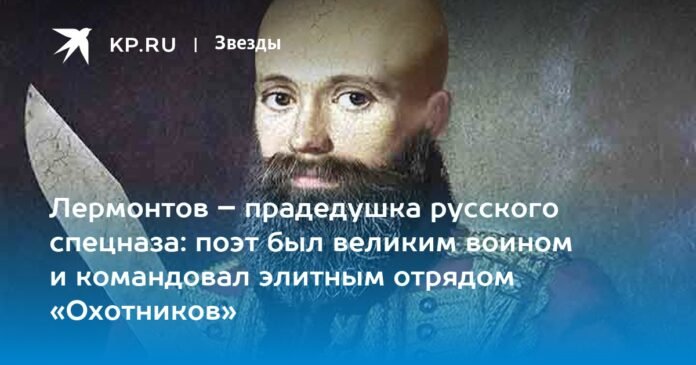Collage of the artist “KP”: this is what the poet looked like in the “hunter” squad. Only, of course, without the gold-embroidered uniform.
Photo: Alexey Stefanov. Go to Photobank KP
Take a closer look at the classic portrait of Mikhail Yuryevich Lermontov. What do you see?
A young man, but already starting to go bald. Feminine traits. Soft and loose… One word: noble: the heavenly clouds are eternal wanderers…
But God forbid you meet this young man on the battlefield! Because the brilliant poet showed himself to be a desperately brave commander… of special forces! Yeah! There was also such a little-known page in his life.
“Wild Squad”
While serving in the Caucasus, Lermontov joined the “hunters” detachment. No, they did not kill ducks or small animals at all and had nothing to do with the supply service. “Hunter” in those days was synonymous with “volunteer”, a person who expressed a desire to serve in the most difficult and dangerous area. For the most part, in intelligence.
One of the “volunteer hunters”, officer Pyotr Sultanov, demoted to the ranks, recalled: “People of all tribes, nations and conditions, without exception, could join that detachment.” The applicant was assigned an exam to perform a difficult task. If the examinee passed the test and remained safe and healthy, he or she became part of the team.
As in any modern special forces unit, preference was not given to the regulation uniform, but to what was comfortable for fighting. The combatants abandoned the uniforms and traditional gold embroidery and dressed in mountain clothing, which had proven effective against the enemy. In addition, the “hunters” shaved their heads and grew beards (now it would be called “tactics”), acquiring an elegant and intimidating appearance, terrifying even their allies. The authorities turned a blind eye to these freedoms, because the volunteers took on the riskiest work. For this reason, “savages” can be tolerated in the regiment.
The soldiers were armed with rifles with bayonets, but in battle they preferred edged weapons. Mostly classic Caucasian daggers, which could easily cut off the enemy’s head. In the camp of “hunters” Suvorov’s modified expression was widespread: “The bullet is a fool, the dagger is a good guy!”
During the war in the Caucasus, where Lermontov ended up in June 1840, the poet volunteered to serve in a detachment that not only fearlessly looked death in the face, but also openly laughed right into the empty sockets of his eyes. In addition, replacing the wounded commander, he led hundreds of desperate thugs from October to December. He ruled successfully, sharing all the difficulties with his people: he refused any privileges, ate from a common pot, slept on the floor…
“I tried war”
His reconnaissance and sabotage detachment acted using Chechen methods: the “hunters” suddenly launched themselves at the enemy like comets and, without giving him time to come to his senses, disappeared…
A significant portion of those units were made up of guilty or generally demoted officers seeking an opportunity to rehabilitate and regain their rank. But many were more attracted to freedom. Among them was Lermontov.
“Even in this campaign, he never obeyed any regime,” admitted war hero Lieutenant General Konstantin Mamatsev, “and his team, like a wandering comet, wandered everywhere, appeared wherever he wanted, but in battle he looked for the most dangerous places.” “.
Despite all the dangers, fate protected Lermontov and even allowed him to stand out. This is what the commander of the 20th division, Lieutenant General Apollon Galafeev, Mikhail Yuryevich’s immediate superior, wrote: “When the wounded cadet Dorokhov was taken from the front, I entrusted his (Lermontov’s) superiors with a team consisting of hunters . It was impossible to make a more correct choice: everywhere Lieutenant Lermontov, everywhere, was the first to be shot by predators and in all matters he showed a selflessness and management beyond all praise…”
In general, the great poet also proved to be a great warrior in war. He would have risen to the rank of general following the example of another partisan, Denis Davydov. And most likely he would have entered military science as a leading practitioner of special forces combat work. However, fate had its own plans…
Perhaps he encountered conflict so desperately because he fought in the special forces:
“I have acquired a taste for war, and I am sure that to a person accustomed to the strong sensations of this bench, there are few pleasures that do not seem cloying.”
The peaceful life seemed too boring to him. That’s why he, rebel, was looking for a storm… How it ended, you know well.

